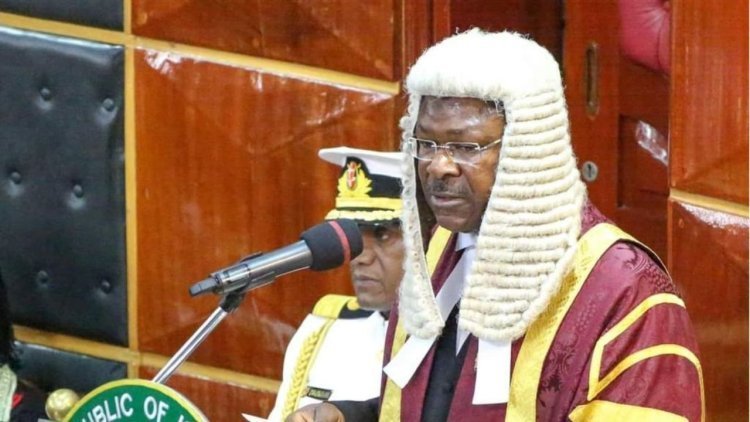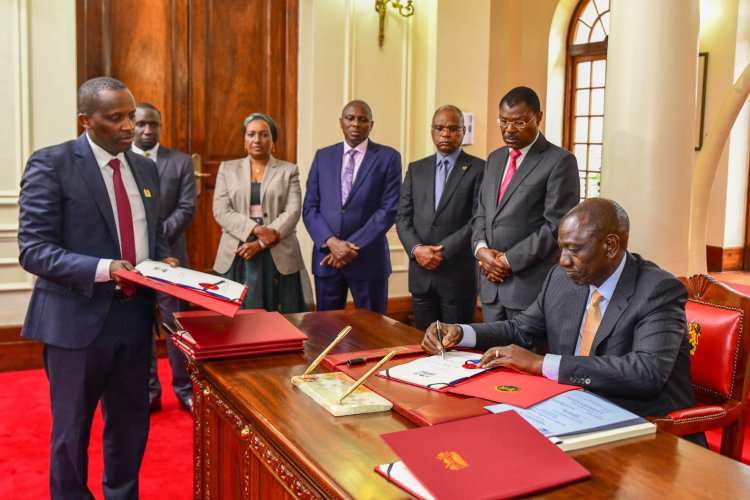Wetangula Issues Orders While Suspending Ruto Educational Reforms
Speaker Moses Wetangula declared that it was unlawful for recommendations to be implemented before passing through Parliament.

Members of Parliament (MP) on Wednesday, September 27 stopped the implementation of the recommendations of the Presidential Working Party of Education Reforms (PWPER).
Speaking during a session in the National Assembly, Speaker Moses Wetangula declared that it was unlawful for recommendations to be implemented before passing through Parliament.
He asserted that the work of the MPs is to legislate, meaning that the recommendations should have passed through Parliament for debate before they can be passed for implementation.
"I repeat nobody; no minister of government can purport to make law or do things that appear to be in the (sic) that they have made law because they have no capacity to make any law," he stated.

President William Ruto assents to the Anti-Money Laundering and Combating of Terrorism Financing Laws (Amendment) Bill, 2023, into Law at State House Nairobi on Friday, September 1, 2023. /PCS
The Speaker therefore directed National Assembly Majority Leader, Kimani Ichung'wah to engage Education Cabinet Secretary (CS) Ezekiel Machogu on the matter.
“Majority leader you will have to engage the minister and I direct you to bring a comprehensive statement on that issue on the Tuesday after next week,” he directed.
Ichung'wah on his part decried that no one, including Cabinet Secretaries, was allowed to wield law-making powers and instead only make recommendations.
"I have nothing much to add because the law is the law. Nobody including Cabinet Secretaries has the power to make law even a presidential working party.
"The best they can do is to make recommendations which, if adopted, those that touch on statutes, then it must begin from this House," he stated.
Among other recommendations, PWPER recommended that the Competency Based Curriculum (CBC) be implemented but with modifications so as to achieve the desired objectives.
“Findings show that CBC is good for the country; it has great potential to lay a strong foundation for relevant human capital development, which is required for societal transformation and sustainable development,” the report by PWPER released on Tuesday, August 1 read in part.
The team led by Prof Raphael Munavu also proposed for the Kenya Institute of Curriculum Development (KICD) to alter the learning areas so that they don't exceed five in pre-primary, not more than seven in lower primary and not to exceed eight in upper primary. In Junior Secondary and Senior School, PWPER recommended nine and seven units to be taught respectively.
The task force also recommended that the Ministry of Education do away with the categorization of public secondary schools from the current nomenclature (national, extra-county, county, and sub-county) to career pathways (STEM, social science, and arts and sports science).
The task force also recommended that the computation of the Kenya Certificate of Secondary Education (KCSE) mean score by the Kenya National Examinations Council (KNEC) be based on Mathematics, English or Kiswahili, and five other best-performed subjects.
PWPER further suggested the Ministry of Education with support from the Ministry of ICT leverage technology at all levels of education by developing ICT infrastructure for curriculum delivery; and improving digital literacy among teachers, parents, and other key stakeholders.
It was also recommended that all students graduating from senior school (secondary school) be subjected to mandatory community service training for a period of three months.
At the same time, those graduating from university will be required to go through the same training for nine months before entering the job market.







